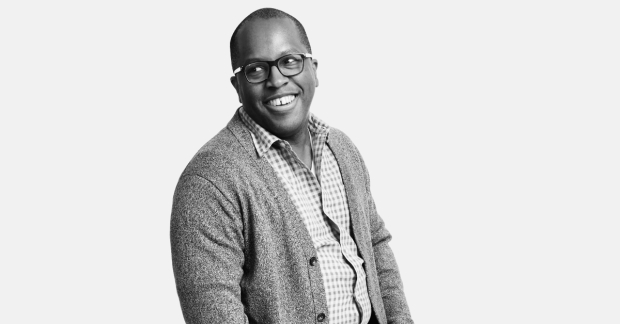Meet the Tony Nominees: Michael R. Jackson on the Long Journey of A Strange Loop to Broadway
Jackson is a double-nominee this year, for his Book and Score to the most nominated show of the season.
After graduating from NYU with a degree in playwriting, Michael R. Jackson began working on a monologue titled Why I Can't Get Work, which followed a gay Black man in New York City dealing with the word. That eventually morphed into a musical about a queer, Black musical-theater writer, trying to write a musical about a queer, Black musical-theater writer. The hit of the off-Broadway season in 2019, Jackson's A Strange Loop, is now the hit of the 2022 Broadway season, up for 11 Tonys including two for Jackson himself (book and score). Here, he tells about this decades-long journey, and why it proves that slow and steady wins the race.

(© Zach DeZon)
This conversation has been condensed and edited for clarity.
You obviously share a name with the pop star Michael Jackson, and you have for your entire life. Now, you're sharing a Broadway season with the musical about him. That must feel like a strange loop in and of itself.
That's what I've been telling people in interviews, that it's a strange loop. Wherever I go, the ghost of Michael Jackson follows me around, and I sort of count that as a weird blessing, I guess.
What is it like to see A Strange Loop on Broadway after all this time spent on it?
It's really validating for me. We live in a time when there's so much instant gratification, and there's always a sense of, you know, "I'll do this, I'll do that, and then I'll get a million dollars from it. I'll get on Broadway in two days." For me, the fact that the show has gotten to Broadway at all has been a testament to the value of taking one's time to do something. I'm certainly not suggesting that's true for everyone in all cases. But I do think that a lot of what people are ultimately responding to, whether consciously or unconsciously, is the style, the music, the lyrics, the performances, the design, are the things that were developed over a long period of time and trying things out, and trying other things out, and cuts, edits, deeper conversations, notes, real work. We're not an overnight sensation. We put all the hours and time in, and I think that the audience can feel that in the quality of what they're seeing.
Can you talk a little bit about your influences with this show? I hear a lot of William Finn and "Four Jews in a Room Bitching" in "Intermission Song," for instance.
Bill was one of my teachers at NYU and he has always supported me, particularly in the early years when I didn't know how to write lyrics at all. But he saw something very personal in what I was writing and I'm sure that reminded him of himself in a lot of ways. He has a willingness to sort of lay it out there and be personal and idiosyncratic, so I would say that he's definitely an influence, if not, someone whose approach is similar. I was a very literate writer to begin with, but I went to NYU to get a sense of the basic mechanics. A lot of my writing lent itself to lyric writing specifically, so I needed my teachers, Robert Lee and Bill and Mindy Dickstein, to help me understand song form, and I sort of took it from there.
What kinds of changes and edits did you and your collaborators make to the show between Playwrights Horizons and Woolly Mammoth and Broadway?
There was nothing earth shatteringly different in terms of the arc of the story, but the nuances and the details are key, so we did quite a lot of just trying to make sure that every transition, every beat, was clear. We really understand that we have to help the audience get from point a to point b and stay on this ride, because it's not a more conventional piece with a more conventional plot. We had to find ways to really underline the idea of why are you here and when can you go home. The ending was also something that we had been grappling with for a long time, because the concept of A Strange Loop is tricky. It's an expression of the concept, which is something that's endless. We had to try to get the ending to as close to what a non-ending ending could be, and for the audience to understand it. Even now, I'm sure that there are things I could do to highlight that even more, but I suspect that the more I try to highlight, the more it will seem even more endless. It's kind of like when you put a mirror in front of a mirror and you try to see to the very end. You can only see so far, because it's just looping back on itself.
Do you ever see yourself returning to the Usher character down the line for a follow-up story?
I don't think so. It's been 18 years. To be honest with you, I'm more curious to see the piece go out into the world and how people interpret it. The fact that this show is a "big, Black, and queer-ass American Broadway show" can mean a lot of different things to a lot of different people. It can be cast in a lot of different ways. I'm interested to see other people run with it, and what they make of it, and how that resonates with their audiences. You can interpret this story in a myriad of ways.











